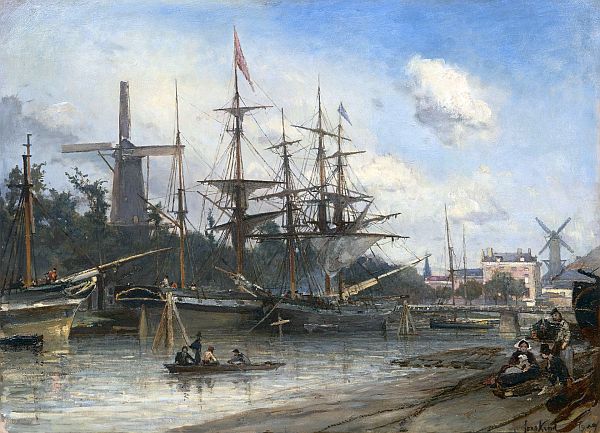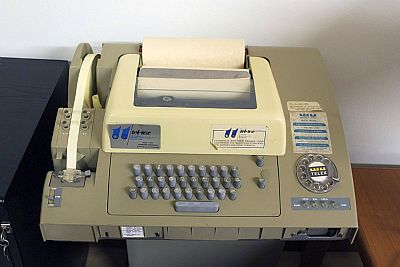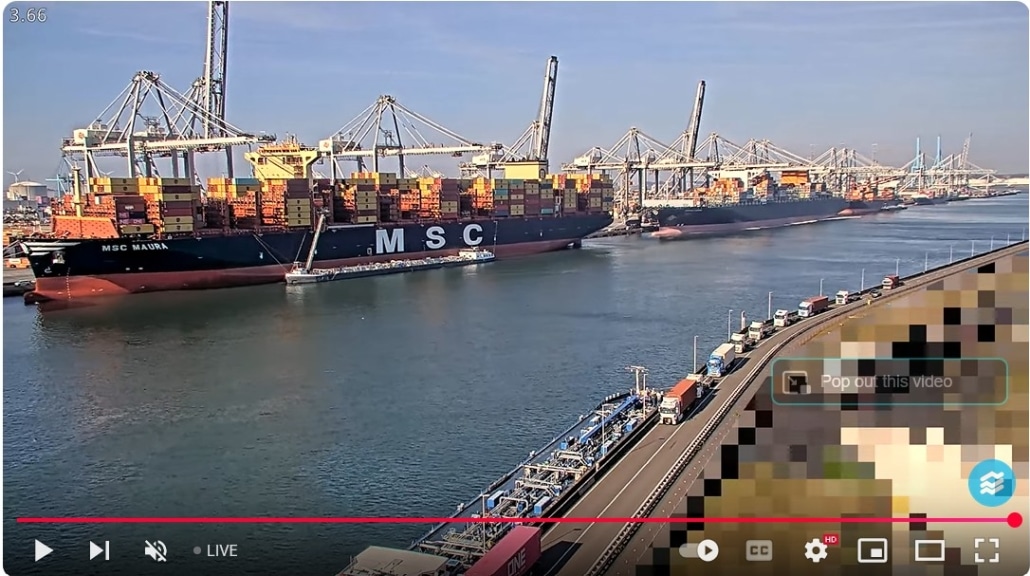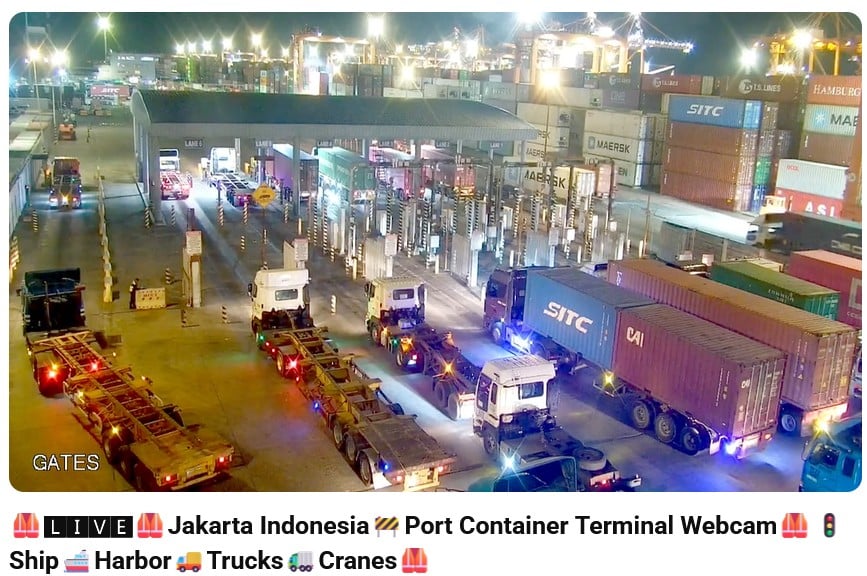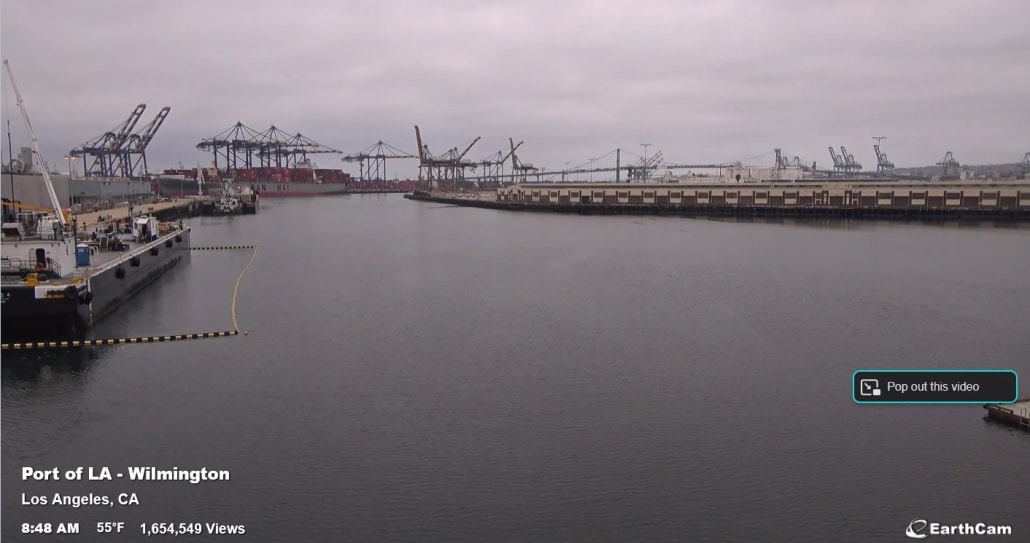Stocking up on Containers of Vapor
[NB: check the byline, thanks. / ~Rayne]
Hold this image in your mind for a few moments; I thought of it after listening to some right-wing propaganda about the tariffs and shipping. Marcy’s post this morning about the emergency-not-emergency trade deficit brought to mind again:
Way back in my salad days I worked in import/export. With the exception of a rather messy breakbulk import of niger seed from Ethiopia, I handled exports of agricultural commodities and manufactured goods.It wasn’t the kind of work one learned in B-school. I learned it all on the job: which products needed phytosanitary certificates; how to handle letters of credit; what to do if customer wanted to charter a plane for a load of 20-foot pipe lengths; what the difference was between terms like EXW, FOB, and CIF. Not the textbook definitions, but the reality-smacks-you-with-a-container-overboard definition.
I also learned how to use intermodal shipping to ports overseas, to what used to be among the largest ports in the world. Felixstowe, Rotterdam, and Kaohsiung were the ports to which I shipped most often.
Trump’s tariffs and the ensuing change in ocean shipping volume triggered a lot of flashbacks over the last couple of weeks, though much has changed since I worked in exports. The current list of largest containerized shipment terminal ports is an indicator of the magnitude of change. Rotterdam no longer cracks the top ten largest ports by shipping volume, while most of the ports in the current top ten are now in China and were definitely not on the list +30 years ago.
Tracking vessels on maps in real time is something I wished I could have had back then. When our freight was loaded on a vessel we didn’t really have anything more than an estimated arrival date by which to plan our load’s arrival. For my first job in exports we didn’t even have email let alone fax to communicate about a shipment’s status.
I used one of these beasts:
It’s just a boat anchor now.
But some things haven’t changed in that period of time. Heck, they haven’t changed much since international shipping looked like the image I shared at the top of this post.
When a port is active, there are ships at the dock. Freight is unloaded. There are vehicles moving that freight about.
Here are two examples of an active port:
Compare the above to this very inactive port: The dates on the images of the inactive port may be more than a week apart, but the level of activity has been consistently low over that time period.Ships moored, being loaded or unloaded, moving to or from docks are all signs of an active port. While cranes hover above, tugboats and other service vessels move about between ships.
Even in low- to no-wake zones, the water shows activity.
There are people and vehicles scuttling about, moving freight once offloaded. Only in an inactive port are there expanses of pavement with no freight, no trucks, trailers, or other vehicles, no people.
Not like the activity visible in the live stream of the container port terminal at Jakarta, Indonesia shown above as an example.
This hasn’t changed in hundreds of years. Not in millennia.
When propagandists declare the drop in ocean shipments to ports in the US is a hoax, they’ve lost touch with a reality based in human history. When they say this is just a temporary hiccup they’re just as out of it.
They are unmoored, one might say.
I’m not going to link to one video in particular that uses ship schedules as an argument freight from China is still inbound to US west coast ports and at volume. It’s an ignorant argument based on a lack of knowledge about container vessels. Container lines still schedule arrivals at port because they may have a partial vessel on a long-arranged route and they don’t want to lose access to the slot in case of a brief disruption in shipping volume. The booking shows as an incoming ship on the schedule even though the container line may be scrambling to consolidate partial loads onto one vessel to reduce fuel.
In some cases ships will approach a port and skip it if they have freight for a different port – let’s say a container vessel from a Chinese port normally scheduled to make sequential drops at Vancouver BC, Long Beach, and Manzanillo MX moors at Vancouver then skips Long Beach and heads for Manzanillo.
It’s clumsily explained as “blank sailing” as CNN’s Erin Burnett explained clumsily on April 25:
And yes, there are some container ships in the screenshot of a vessel tracking site shared widely last week. There are few container ships in that snap of Port of Seattle.
Compare the activity in Port of Kaohsiung, Taiwan, which is no longer in the top ten largest ports based on shipping volume, smaller than Port of Long Beach. It’s crowded with container vessels:
[Screenshot of container vessel tracking at Port of Kaohsiung, Taiwan 1300h ET 11-MAY-2025 via MyShipTracking]
The freight is not coming. It’s not sailing between China and the US west coast, it’s not in the west coast ports. We can literally see this from space, by way of GPS tracking. There are no container vessels waiting off west coast ports for a berth. There will not suddenly be ships off the west coast before the end of the month.
Why the right-wing insists on lying about this rather than bracing themselves and preparing the country for the reality check to come in mere days is beyond me. They can’t spew enough believable denials to hide the shelves as they empty in the days and weeks ahead. They can’t cover up the damage already done to the US economy, the worst of which has yet to arrive.
Conditions won’t change much based on the so-called 90-day pause and temporary tariff reduction announced overnight. It’s still going to take time for factories in China to ramp back up, rejigger containerized shipping – and all of this is at risk of being changed again in 90 days. The loss of faith by consumers and business purchasers here in the states may not be restored as quickly.
The reduction of tariffs on Chinese goods from 145% to 30% will not be enough to prevent some businesses from failing. Those operating on margins of less than 10% are at extreme risk during the next several months.
Or maybe less if Trump vacillates again.

